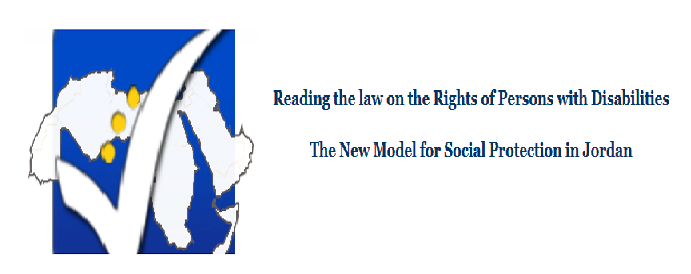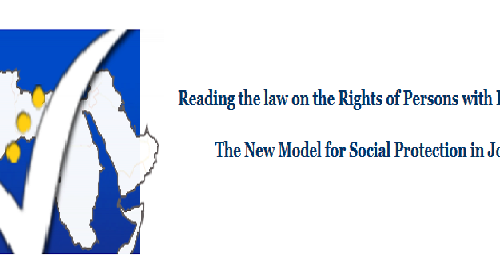Reading the law on the Rights of Persons with Disabilities
The New Model for Social Protection in Jordan
Jordan signed the International Convention on the Rights of Persons with Disabilities on 3/3/2007 and, after almost a year,on 31/3/2008 it was ratified, showing Jordan’s commitment to the implementation of all the provisions of this Convention. Moreover, having been published in the Jordanian Official Gazette, it is enforceable, binding and it has become an integral part of the Jordanian legislation.
In accordance with the provisions of this Convention, the Kingdom is obliged to harmonize its laws and legislation in accordance with the international standards set out in the Convention, although its legislation does not conflict with the provisions.
Article 33 of the Convention states that the signatory and ratifying States of this Convention shall be bound by the provisions of this Convention at the domestic national level.
The Kingdom took this real commitment to develop its laws in accordance with the terms of the Agreement, with international human rights standards and in line with the Convention on the Rights of Persons with Disabilities. This shall be realized through the implementation of the national strategy for the overall objectives of persons with disabilities, their integration in public life providing rewarding opportunities and non-discrimination on the base of disability or because of considering persons with blocking part of the nature of human diversity. It should be provided a reasonable accommodation within specific time frame, to enable them to access facilities, buildings and public places to receive services smoothly and control specific criteria for the exemption of Persons with disabilities from many obstacles to their integration into society. A new draft law, entitled “Law on the Rights of Persons with Disabilities”was issued for the year 2016, which was approved and ratified by the National Assembly. During the discussion of the bill, the name of the law was questioned. Is it the same name or the law of the rights of persons with special needs? The end resort to the first name, in line with international names and terms, and with the title of the international agreement.
One of the basic reasons for the development of this new legislation is to create a society in which people with special needs have a decent and sustainable life that will enable them to participate effectively, based on equity and equality, because of the lack of community awareness in dealing with people with disabilities and lack of skills and know-how, although the presence of institutions concerned and capable of dealing with the disabled.It was necessary to have a law obliging the members of the society to participate, work to accept and integrate, involve people with special needs in society and to deal with their disability on the principle that it does not prevent their participation in the building and development of the country. They are also an integral part of the process of construction and participation and they have the right to exercise their normal and normal life outside their homes and in all places and all facilities in a natural, easy and smooth manner. Everyone should blow their energies and do not tie them by teaching them, training them and rehabilitating them and providing them with facilities and care so that they can contribute to the construction process and not be burdensome in the society.
The most important thing in the draft law
Which was ratified by the National Assembly (MPs)
- The law is keen to respect the rights of persons with disabilities and preserve their inherent dignity, freedom of choice, individual independence and non-discrimination on the base of disability and the provision of equal opportunities and equality between men and women with disabilities in the rights and duties, their integration into society and their participation in the formulation of policies, plans, programs and decisions of their own. Thus, sharing national plans and programs in the public budget, guarantee the rights of children by developing their abilities and skills, and reduce physical barriers and barriers to their integration into society (Article 4).
- Disability alone does not prevent the person from being considered fit for work, education, rehabilitation and to exercise of all rights (Article 5).
- An ID card is issued by the Supreme Council for the Rights of Persons with Disabilities to indicate the nature and degrees of disability in order to benefit from the total and partial exemptions and percentages allocated for employment of disabled people and admission to educational institutions.
- Establishment of a higher council for the rights of persons with disabilities.
- No person may be excluded from any educational institution on the base of disability or because of it. Nor shall they be deprived of any academic study on the base of disability.
- Emphasize the development and inclusion of policies in terms of the rights and acceptances of persons with disabilities as part of the nature of human diversity and provide all means to achieve the highest academic level and provide qualified cadres for this educational and educational purpose and suitable infrastructures.
- To develop the foundations that admit persons with disabilities in institutions of higher education to ensure respect for their choices and desires and without any form of discrimination on the base of disability or because of it.
- Obligation of universities to reduce university fees so as not to exceed the maximum of (10%) of fees imposed on students.
- Compelling the Ministry of Health to provide a special care to people with special needs and exempting them from medical fees and issuing health insurance cards to them free of charge.
- Under the new law, no person may be excluded from work or training on the base of disability or because of it, so that the disability itself does not constitute a barrier to the advancement, promotion and promotion of a job or job.
- Compelling governmental and non-governmental entities, which have more than 25 employees and not more than 50, to employ a person with a disability, and if the number exceeds that, allocate 4% of their vacancies without prejudice to scientific qualification.
- A person with a disability may not be placed in residential care homes without his personal consent unless he is not privileged and poses a danger to himself or to others.
- Developing national strategies for loans and poverty alleviation for people with disabilities to help them reach small and productive projects.
- Providing psychosocial and health support programs for people with disabilities, and programs to prevent violence and exploitation, ways and means of reporting any exploitation or violence, protecting and maintaining the confidentiality of their identity.
- Failure to permit licenses for public and private buildings or any establishment providing services to the public unless they are compatible with the accessibility and use of people with special needs.
- Compelling all means of public transport of all types and forms to be in the use of people with special needs and exempting these means from customs duties.
- The law imposes punishment on whomever aggresses persons with disabilities. Moreover, it considers that the deprivation of work or education of persons with disabilities is a form of violence punishable because many families and under the burden of shyness hides the isolation of one member and isolates them from society. The new law considers that this act is a crime punishable by imprisonment and fine.
- It is clear that this law is meant to put deterrent penalties for those who stand in the way of integration of people with special needs in society and also for those who do not comply with the rates prescribed for the work of people with special needs and decided by the law and protected the whistleblowers and informed them to protect them to encourage people to report without fear or shame because there are relatives, friends or neighbors who cannot report an attack on the freedom or the body of the disabled under the influence of the literary impediment or the relationship or friendship or neighborliness, maintaining the confidentiality of the identity. It was necessary and productive in such cases, and the law expanded the penalties in case of repetition and return to action again.
At the end of this article, devoted to the study of the new law of disabled people, it is a modern law that complies with international standards and conventions in the field of human rights and the International Convention on the Rights of Persons with Disabilities and the transfer of the law from the concept of care and accommodation to integration and participation.Whereas, the previous laws were housing laws looking for the best conditions and ways to isolate those who are disabled and care for them, without fearing the community for fear of them and their feelings, protection and the protection of the community from each other and those who pose a danger to others, sheltering them in a hostel and a carefree home from their communities look at them with compassion and compassion, The new law destroyed the idea of shelter and encouraged, nurtured and committed to the promotion of approaches that privilege integration, participation and capacity-building for the disabled and the dismantling of the concept of the shelter system.
We have participated with the Amman Center for Human Rights Studies and the Arab World Network for Election Observation, funded by the Civil Volunteer Group (GVC) to support the adoption of this law and the Council of Representatives and its members have been mobilized to lobby for this law. Indeed, we succeeded in what we sought and the bill was passed in the House of Representatives after he obtained an absolute majority vote and was approved and now is in the final legislative stages of its issuance.
هكذا قيّم مستعملون آخرون المقال

